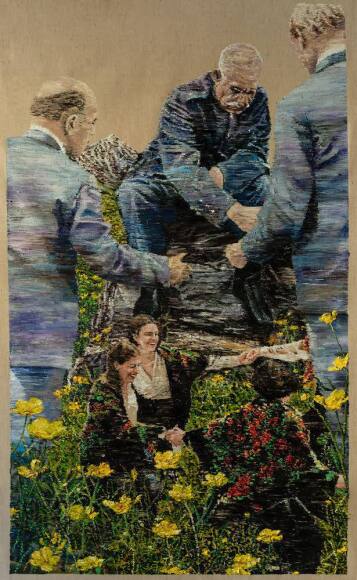
Foothills of Mount QÄF
Oil on canvas 82.5 × 53 in (209.6 x 134.6 cm)
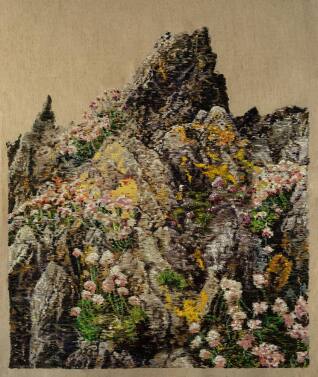
Mount QÃF
Oil on Canvas 59 × 43 in (150 x 110 cm)
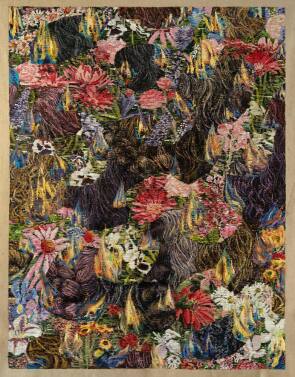
Trial By Fire
Oil on canvas 59 × 43 in (149.9 x 109.2 cm)
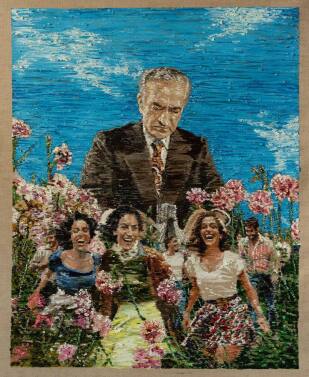
Happiness Under The Blue Sky
Oil on canvas 40 × 27.5 in (101.6 × 69.9 cm)
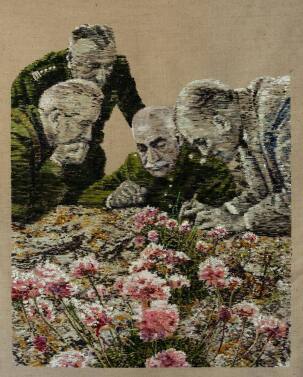
Builder
Oil on Canvas 40 × 27.5 in (101.6 × 69.9 cm)
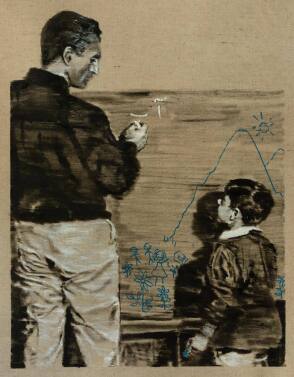
Water, 2023
Oil on canvas 40 x 27.5 in (101.6 x 69.9 cm)
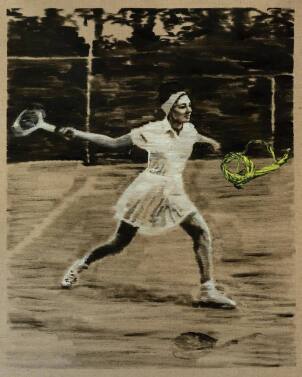
Game, Set, and Match, 2023
Oil on canvas 40 x 27.5 in (101.6 x 69.9 cm)
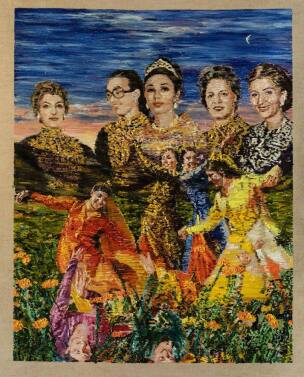
2500 & Counting
Oil on canvas 40 x 27.5 in (101.6 x 69.9 cm)
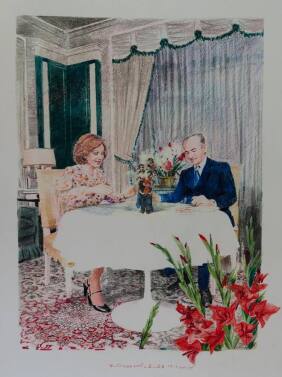
Untitled
Color pencil on paper 20 x 27.5 in (50.8 x 69.9 cm)
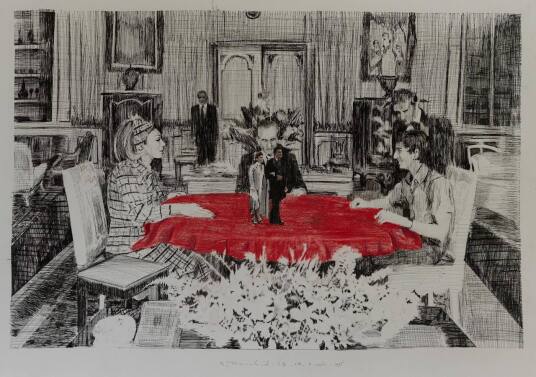
Untitled
Color pencil on cardboard 20 x 27.5 in (50.8 x 69.9 cm)
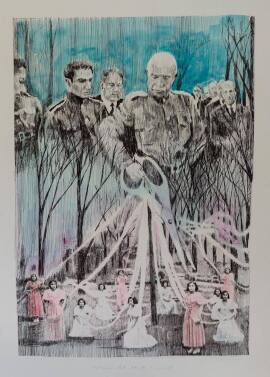
Untitled
Color pencil on cardboard 20 x 27.5 in (50.8 x 69.9 cm)
2023
A Lively Spring Garden collection
Hamzianpour & Kia is proud to present A Lively Spring Garden, a solo show by Tehran-based artist Soudeh Davoud which opens September 9th and runs through September 26th. It consists of eight works in oil on canvas (six in color and two B/W) and three additional works on paper, all created specifically for this show. This is Davoud’s second U.S. solo exhibition (her first debuted last year also at our gallery); it takes off where the previous show left off and moves in fresh directions. Davoud’s new works display a greater density; they incorporate more texture and stronger and deeper colors than previous works, reflecting the greater depth and intensity of ideas and emotions that are being expressed in this show.
The show’s title is part of a verse in the great Persian epic poem Shahnameh (Book of Kings) – from a chapter that compares a mytho-historical land named Iran to a thriving garden in the Spring, and warns of dire consequences if that land is not fiercely protected. The title’s provenance speaks to the multitude of themes that have inspired and are present in the current works – Davoud draws on both the history and the mythology of Iran to delineate the reality she observes around her, as well as her feelings about this reality. Recognizable personages from 20th-century Iranian history appear throughout; but they are represented using visual and context cues that prompt a metaphorical reading. Davoud also plays with scale in order to infuse an even greater sense of the surreal; the historical characters are often depicted on a scale that is incompatible with other people and elements that surround them. Consequently they loom as larger-than-life and larger than any one specific meaning. As such, rather than simply signifying themselves, these personages begin to take on symbolic significance – like characters in mythology. Elevated to archetypal status, they can represent themes that are both universal and personally important to Davoud – the same themes that are also ever-present in the mythology of Iran as well as other cultures.
Davoud uses notions of place (or lack thereof) to play with expectations about specificity and meaning. When utilizing archival photographs as sources, Davoud often removes the background and situates the personages on a blank or non-specific field. When there is reference to place, it is a mythological and/or symbolically significant place – as in mount Ghaf or the Damavand peak. In this way the space of Davoud’s pieces becomes a site for the merging of many realms – mythical and historical, real and folkloric, past and present. In accomplishing this complex merger, she deliberately and deftly engenders an ambiguity of narrative and meaning. The viewer is invited to weave their own narrative from the images in each piece and about the show as a whole. (The same invitation was made in Davoud’s previous show at Hamzianpour & Kia, albeit more literally by way of a needle and thread hanging from one of the paintings.) Perhaps most significantly, what emerges is an encouragement to forge a possible future narrative, not only or necessarily about Iran but about civilization as a whole.
Ideas and images associated with weaving hold a powerful presence in Davoud’s work; knitting and needlepoint are popular among the Iranian public, and Davoud grew up watching and learning these crafts. The current pieces further elevate the idea of weaving – the richness of
color and silkiness of texture reference the preeminent woven art-form of Iran: the Persian carpet. This is augmented and amplified by Davoud’s technique of piecing together images from different photographs with her own visual renderings of imagined elements from the epic poems.
Women continue to loom large – literally and metaphorically – in Davoud’s work. They hail from disparate socioeconomic standings, but do not stand in conflict with each other or with the men (who are often in the background, in supporting roles). Throughout, they exude an energy of strength, determination, and often exuberance. That powerful exuberance is echoed by the brightly-rendered natural elements that burst out around them – suggesting an intimate relationship between (wo)man and nature which is fundamental to a thriving society. When not literally present, women are represented by the flowers themselves (in “Ghaf Mountain”) and/or by tufts of hair that intertwine with the flowers (in “Trial by Fire”).
Davoud took to drawing and painting at a very early age. She did not speak until the age of 4 or 5; during this time, she used drawing and painting to communicate with others and entertain and soothe herself. Her affinity for image-making stayed with her until it was time to choose her subject of advanced study, and with much insistence she applied to and entered art school. In her work she draws on both eastern and western influences. Impressionist strategies of patchwork and broken-color have always informed her technique, with impasto being a more current and striking addition. Moreover, Davoud dispenses with under-drawings and works directly with color, giving the works a heightened sense of vibrancy and immediacy. From the history of Iranian art, she counts both the venerable practice of miniature painting and the relatively more recent Ghahveh-khaneh school among her influences. As is the case with Davoud’s work, both traditions have strong associations with storytelling; and both tend to use scale rather than perspective to organize the tableau and delineate a hierarchy of importance among the components.
Soudeh Davoud (born 1998, Tehran, Iran) began her professional career with Tehran’s Aun Gallery under the management of Afarin Neysar. Davoud was one of nine Iranian women artists in the seminal exhibition, “A Bridge Between You and Everything” at The High Line Nine gallery in New York City, curated by the Iranian artist Shirin Neshat. To date, she has presented six solo exhibitions in Iran and Europe. Other group exhibitions include shows at Palazzo Bastogi Museum in Florence, curated by Middle East and Europe Specified Institute of Contemporary Arts (SAFPEM / 2018); and the Asia House in London (UK), curated by Capital Art Society (2018). In 2020, Davoud was selected as one of “The Women Artists Who Deserve Our Attention”, according to 9 Leading Artists from Artsy Magazine. In 2021, she had a solo show at Janet Rady Fine Art LTD in London. She holds a B.A. in painting from the University of Science & Culture (Tehran-Iran) and an M.A in painting from Islamic Azad University (Tehran- Iran).